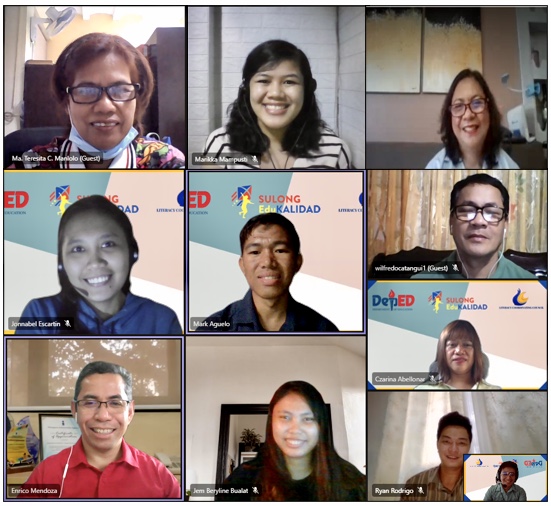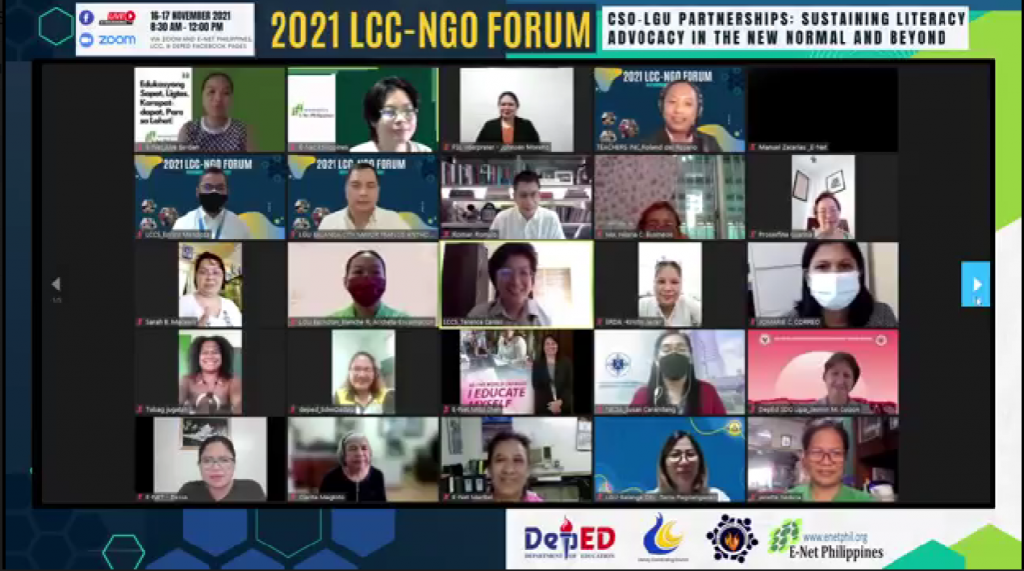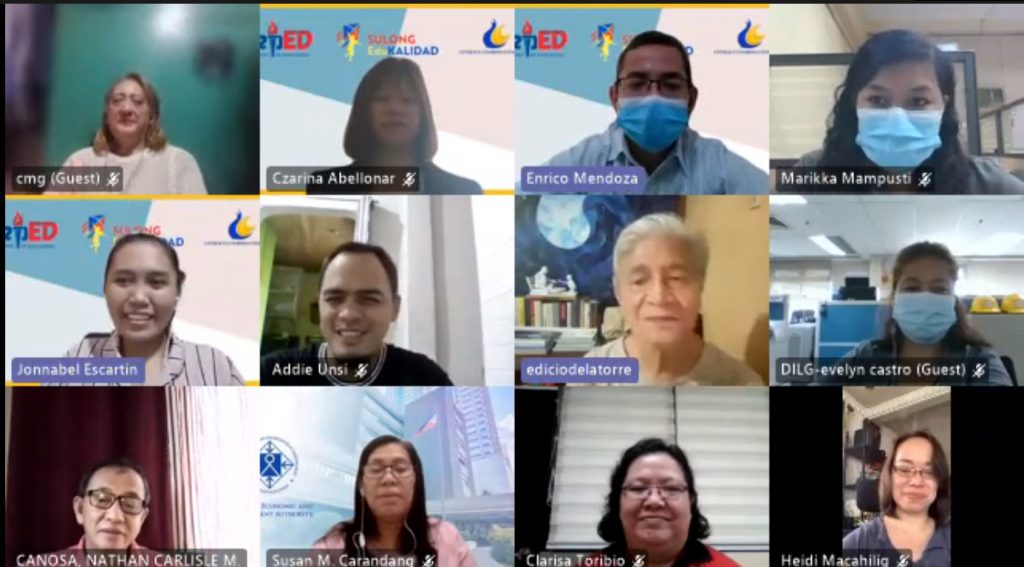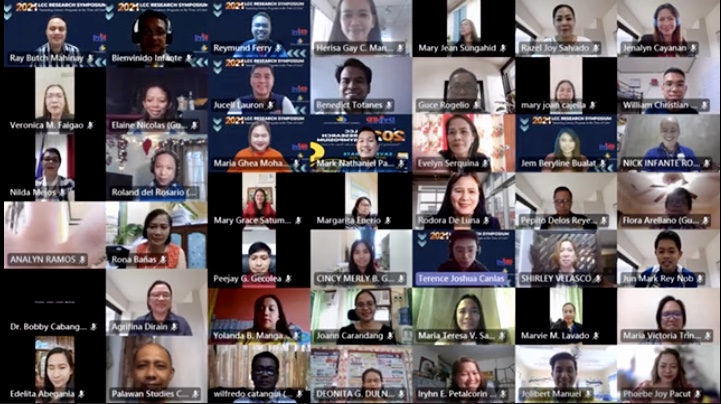
Jumping off from the challenging year that was brought to us by the pandemic, the Literacy Coordinating Council (LCC) has commenced the year with much hope and optimism to emerge from the lessons learned from the previous year and establish a renewed focus in delivering programs, projects, and activities with excellence.
With the goal to sustain literacy advocacy and intensify social mobilization efforts and existing partnerships, the LCC has kicked off the year through the conduct of a workshop on the development of the LCC Communication Plan, which was later finalized and adopted by the Council through an LCC Resolution. Shortly after that, the LCC ran a workshop on the finalization of the LCC Coffee Table Book Volume 2 that highlights the best practices and success stories of the implementation of literacy programs initiated by various LGUs and NGOs. By April 2021, the LCC had begun its months-long preparation for the 2021 National Literacy Conference which was successfully conducted on September 6 to 7, in conjunction with the annual celebration of the National Literacy Week. Additionally, to boost the literacy advocacy, the annual 2021 LCC-NGO Forum was held last November 16-17, 2021 where Civil Society Organizations and other stakeholders from different sectors convened to share their best and innovative practices during the new normal, and at the same time, provide policy recommendations instrumental in eradicating illiteracy in the country.
With the aim to increase public awareness of LCC’s programs and projects, the Council has also conducted multiple workshops to widen the reach of available platforms and materials that serve as the council’s channel of knowledge and information for its stakeholders. This has been acted upon through the development of Information, Education, and Communication (IEC) materials that paved the way to the production of audio-visual presentations (AVPs) bringing light to the major programs and projects of the LCC. Furthermore, this was followed with the workshops on the crafting and lay-outing of the 2021 LCC Annual Report, enrichment of the LCC website, series of database updating and system enhancement, and development and finalization of the 11-module National Literacy Information System (NLIS) User’s Manual.
With policy research and development as one of its cores, the LCC has also been successful in its mission to provide policy and program directions for all literacy endeavors in the country through the adoption of the LCC Resolution No. 01 – Guidelines on the Foundational Framework and Analytic Scoring Rubric for Exemplary Community-based Literacy Programs and Engagement which was backed by the conduct of series of Orientation Workshops for the Luzon, Visayas, and Mindanao clusters, as well as the development of a Research Manual for the Foundational Framework for Exemplary Community-based Literacy Programs and Engagement, to ensure effective implementation of the policy. In addition, the LCC has also carried out the 2021 Research Symposium where researchers all over the country congregated and were recognized for their hard work and grit in doing the groundwork for literacy in the form of research.
Apart from strengthening the literacy advocacy in keeping research and policy development at arms’ length, the LCC has also lived up to its mandate to promote literacy at the grassroots level particularly in the Local Government Units (LGUs) through the creation of local literacy councils. This commitment has been performed through the conduct of a series of workshops specifically on the development, lay-outing, and finalization of the Manual on Localization of LCC, as well as on the development of a monitoring and evaluation tool for the LCC Localization.
On top of all these accomplishments, the LCC has remained dedicated in the pursuit of continuous improvement not only of the delivery of its programs, projects, and activities but also of its workforce management. Aside from the established practice to assess the performance of the Council every midyear and year-end, LCC held a series of activities for its Secretariat on Results-based Performance Management System (RPMS), which focused on performance review, rating, commitment, and planning. The LCC Secretariat has also been capacitated with the right mindset, attitude, and approach to suitably adapt to and cope with the new normal with the help of a series of pep talk sessions and staff development workshops for the whole year. Over and above that, the LCC has also stepped back to strategically and systematically plan how to eradicate illiteracy in the country through the series of workshops on the recalibration, validation, and finalization of the LCC Roadmap and 2022 LCC Strategic Plan, as well as the conduct of LCC’s quarterly council meetings.
In total, the LCC has conducted 42 virtual activities and 3 major events. Having all these programs, projects, and activities successfully carried out, the LCCS has also strengthened its culture of feedback through the analysis of results gathered from evaluation forms issued in all its events and activities. On average, the LCC ecstatically shares its rating of 3.92 out of 4 which signifies its very satisfactory performance in running its activities and events. To celebrate these milestones and recognize excellent performance, the FY 2021 LCC Secretariat Awards was conducted with the theme “Recognizing Excellence, Celebrating Wins.” This initiative is part of the Council’s Program on Awards and Incentives for Service Excellence (PRAISE).
With the year 2021 coming to a close, the LCC acknowledges the upheaval of the last two years but at the same time, looks forward to the following year with much more confidence and optimism that little by little, eradication of illiteracy in the country will not only be a dream but a goal achieved.



LCC Secretariat